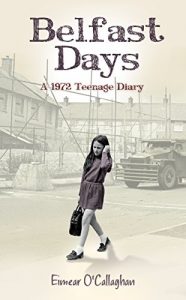Belfast 1972. It’s the bloodiest year of the Northern Irish ‘Troubles’ and sixteen-year-old Eimear O’Callaghan, a Catholic schoolgirl in Andersonstown, West Belfast, bears witness in her new diary. What follows is a unique and touching perspective into the daily life of an ordinary teenager coming of age in extraordinary times. The immediacy of the diary entries are complemented with the author’s mature reflections written forty years later. The result is poignant, shocking, wryly funny and above all, explicitly honest.
This unique publication comes at a time when Northern Ireland is desperately struggling to come to terms with the legacy of its turbulent past. It provides a powerful juxtaposition of the ordinary, everyday concerns of a sixteen-year-old girl – who could be any girl in any British or Irish city at this time, worrying about her hair, exams, clothes, discos – with the unimaginable horror of a society slowly disintegrating before her eyes, a seemingly inevitable descent into a bloody civil war, fuelled by sectarianism, hatred and fear.
Written by an experienced broadcaster and journalist, Belfast Days demonstrates how one person’s examination of her own ‘story’, upon rediscovering her 1972 diary on the eve of the publication of the Saville Report, provided her with a new perspective on one of the darkest periods in twentieth century British and Irish history.
This unique publication comes at a time when Northern Ireland is desperately struggling to come to terms with the legacy of its turbulent past. It provides a powerful juxtaposition of the ordinary, everyday concerns of a sixteen-year-old girl – who could be any girl in any British or Irish city at this time, worrying about her hair, exams, clothes, discos – with the unimaginable horror of a society slowly disintegrating before her eyes, a seemingly inevitable descent into a bloody civil war, fuelled by sectarianism, hatred and fear.
Written by an experienced broadcaster and journalist, Belfast Days demonstrates how one person’s examination of her own ‘story’, upon rediscovering her 1972 diary on the eve of the publication of the Saville Report, provided her with a new perspective on one of the darkest periods in twentieth century British and Irish history.






